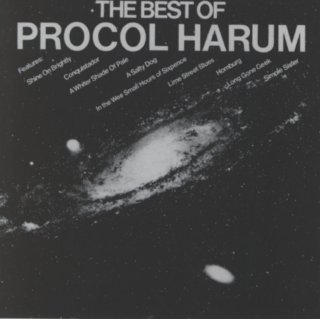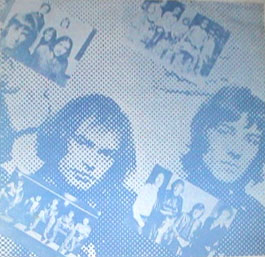

Left, the A&M cover; right, the insert for the blue-printed Korean version of the same album
Procol HarumBeyond |
|
|
PH on stage | PH on record | PH in print | BtP features | What's new | Interact with BtP | For sale | Site search | Home |
|
|
|
|
|
Left, the A&M cover; right, the insert for the blue-printed Korean version of the same album |
|
Year released:
|
3. Homburg |
||
|
7. Salty Dog |
9. Whisky Train |
|
|
10. Simple Sister |
11. Conquistador |
|
Liner notes:
The following was written in April 1969 to accompany the release of A Salty Dog. The words depict a universality which continues to distinguish Procol Harum's contribution to the world of music.
Procol Harum is a commune, a workshop, a whatever, five musicians and one poet-in-residence, who have survived England's pop-explosion - an explosion which left in its wake a number of ephemeral successes. Why have they made it for the past three years, and why will they continue to make it? Because they are real musicians with something to share with those who listen with more in their palate-palette than bubblegum.
Who are they? They are six young and somewhat elusive Englishmen ranging in age from twenty-one to twenty-four. Gary Brooker - vocal / piano, Robin Trower - guitar, Matthew Fisher - organ, David Knights - bass guitar, Barrie Wilson - drums, Keith Reid - lyricist. Their beginnings? September 1966, when Keith Reid was introduced to Gary Brooker by a mutual friend who said, 'This is Keith, he writes words,' and 'This is Gary, he doesn't write words.' Gary took 'the packet of words' away for a couple of weeks and came up with the music to A Whiter Shade of Pale and out of answering ads, 'organist wants work' and ' looking for guitarist' these six youngsters, all untried, [sic] all unknown, all strangers, came together. Out of auditions in pubs and rehearsals in churches came a young group which prompted London newspapers to acclaim then as 'the new Beatles'.
When asked how they met, they said they would like to think that they all had a dream to meet at Waterloo Station a week from that night and that each followed his dream.
Their name, Procol Harum, was taken from a Burmese blue cat which belongs to a friend of Keith Reid. Latin in origin, Procol Harum defies translation. However the cat, according to Gary Brooker, 'has magical properties, is an uncanny cat - no-one has ever been able to take his picture'. The boys have one common denominator: they are all self-made self-dependent young men whose backgrounds include such various activities as window cleaner, construction labourer, asbestos sprayer's assistant and coffee-shop manager. They consider that they are 'riddled with musical influences' and yet they will not define their music, for they believe it speaks for itself. Keith claims that his major lyrical influences came out of the slums of London and denies there is any sociological or socio-economic entity to the group. They shun all labels other than that they are 'self-dependent'.
While not exactly a barometer of their success, an interesting indication of their progress is the fact that in October, 1968 they played the bottom of the bill at the Fillmore East, while March of 1969 found them the headline act.
John Mendelsohn.
As with all communes, the identities of Procol Harum's inhabitants have undergone occasional changes; Robin Trower now leads his own band, as does his replacement David Ball. David Knights is a manager and Matthew Fisher has produced several albums, including Robin Trower's. Procol's namesake, the cat, died in 1972, leaving the band to carry the standard alone.
The sleeve notes include personnel and producer details, as well as the following brief song-commentaries:
A Whiter Shade of Pale: the most prominent wild party in pop music's recent history.
Lime Street Blues: no small debt owed to R&B, Procol depicts a tragic story of life and injustice on Lime Street ... a specifically prime influence appears to be Georgie Fame's mid-Sixties style
Homburg: perhaps the classic exercise of the early Procol musical format.
In the Wee Small Hours of Sixpence: a vigorous, imaginative view of some of life's mysteries.
Quite Rightly So: a personal look at the human condition; the very first Procol song anyone heard in stereo.
Shine on Brightly: one man's dementia is another man's vision
A Salty Dog: a magnificently wrought sea epic
Long Gone Geek: a grinding rock and roll adventure story. Matthew Fisher's last release with the group.
Whisky Train: a drinking song originally conceived by Keith Reid as country and western until Robin Trower got hold of it
Simple Sister: familial interplay taken to a savage musical extreme
Conquistador: historical imagery abounding. The revival of this oldie in concert with orchestra earned Procol Harum their due.
|
PH on stage | PH on record | PH in print | BtP features | What's new | Interact with BtP | For sale | Site search | Home |